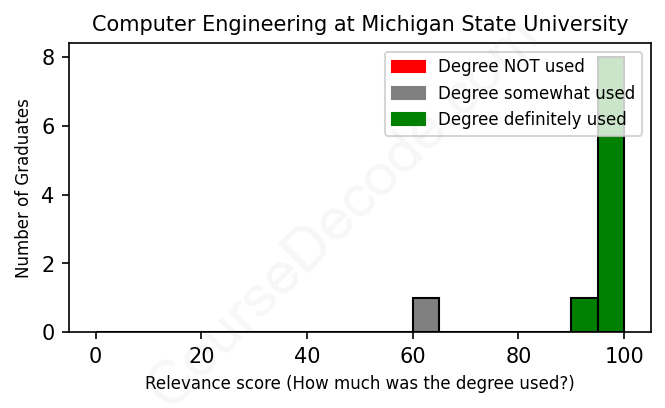
First, some facts. Of the Computer Engineering graduates from Michigan State University we've analyzed , here's how many have used (or NOT used) their degree in their career:

These are estimates based on AI analysis of 10 LinkedIn profiles (see below).
The verdict? Great! Overall, with an average relevance score of 94%, Computer Engineering graduates from Michigan State University have a substantially higher likelihood (+27%) of finding work in this field compared to the average graduate across all fields:
And for comparison, here's the chart for all profiles we've looked at across all degrees.
Also, after graduating, only 10% of these graduates have pursued further education other than another Bachelor's degree (such as a Masters degree or other), compared to the average across all profiles of 35%. This suggests a Bachelors degree is enough for most Computer Engineering graduates, and it's normal to look for work straight after graduation.
See the details:
|
Relevance score: 100% We think this person has gone into a career highly relevant to their degree. We think this person has gone into a career highly relevant to their degree.
DEGREE INFOGraduated in 2021 from Michigan State University with a Bachelor of Science - BS in Computer Engineering. No other secondary education since. JOB HISTORY SINCE GRADUATIONSoftware Developer Epic Jan 2022 - Present ABOUTI am a software developer at Epic in the Research Informatics team. I graduated from Michigan State University with a BS in Computer Engineering. I have experience and training in software design principles with a focus on C, C++, Java, Python, Linux and Android applications. I also successfully completed a six-month internship at a leading technology company, Cisco Systems, where I worked in Quality Assurance within the Enterprise Networking and Cloud Division. |
The top 10 most common jobs done by the graduates we've analyzed (ranked most common to least) are:
From the profiles of Michigan State University graduates with degrees in Computer Engineering, it’s clear that many of them have found their way into software development roles. Jobs like Software Developer, Software Engineer, and positions related to programming and system analysis are pretty common. Whether they’re at companies like Auto-Owners Insurance, Ford, or even in roles at Capital One, a strong emphasis on coding, data structures, and engineering principles is a recurring theme. This shows that graduates are leveraging their technical skills effectively in jobs that align quite well with their education.
However, it's worth noting that not every position directly connects to the core of Computer Engineering. Some roles, like in tutoring or more business-oriented tasks, don't utilize their engineering skills in the same way. Still, the majority are in positions that directly relate to their degree, demonstrating a favorable trend for Computer Engineering majors in entering relevant fields. Overall, their careers seem to reflect a solid alignment with computer engineering, especially in software-related roles, which is a great sign for anyone considering this path!
Here is a visual representation of the most common words in job titles for Computer Engineering graduates (this is across all Computer Engineering graduates we've analyzed, not just those who went to Michigan State University):

Looking at the career trajectories of graduates from the Computer Engineering program at Michigan State University, it seems like they are generally on a solid path in the tech world. Most of these graduates land their first jobs shortly after graduation as software developers or engineers, which is pretty typical for this field. For example, a lot of alumni secured positions at reputable companies like Microsoft, Ford, and Capital One right after graduation. There’s a clear trend showing that many started in entry-level software engineering or related roles, which often provide a strong foundation for their careers.
Fast forward a few years, and it looks like many graduates continue to climb the ladder in technology-focused roles, often moving into more specialized positions like Senior Software Engineer or even Machine Learning Engineer. For instance, alumni from 2019 and 2021 have progressed to higher roles in notable tech firms, showing that they’re not just stuck in dead-end jobs. Overall, most seem to find fulfilling careers that are relevant to their Computer Engineering degrees, which is a great sign for anyone considering this path. While there's always some variation in individual experiences, the majority appear to be thriving in their careers related to computer engineering.
Honestly, pursuing a Bachelor’s degree in Computer Engineering, whether at Michigan State University or somewhere else, can be pretty challenging. You'll be tackling a mix of tough math, physics, and programming courses that demand a solid understanding and a lot of problem-solving skills. It’s not just about memorizing facts; you’ll need to really grasp how systems work together and think critically to design and troubleshoot. That said, if you've got a passion for technology and a decent background in math and science, you might find it manageable—just be prepared for some late nights and group projects. Overall, it's definitely on the harder side compared to average degrees, but if you stay organized and motivated, you can totally handle it!
Most commonly, in the LinkedIn profiles we've looked at, it takes people 4 years to finish a Bachelor degree in Computer Engineering.
Looking at the job trajectories of these Computer Engineering grads from Michigan State University, it seems like they’ve generally landed pretty well in terms of salary prospects. Many of them started with solid positions at reputable companies like Microsoft, Ford, and Capital One, which usually pay good salaries, especially for tech roles. The co-founder position suggests entrepreneurial success, and roles at companies like Indeed and Verizon hint at competitive compensation too. Even the recent grads are kicking things off with tech roles, which generally come with decent pay, especially for those in engineering and software development. Overall, it looks like they should be doing pretty well for themselves financially!
Here is a visual representation of the most common words seen in the "about" section of LinkedIn profiles who have a Bachelor degree in Computer Engineering (this is across all Computer Engineering graduates we've analyzed, not just those who went to Michigan State University). This may or may not be useful:

Here are all colleges offering a Bachelor degree in Computer Engineering (ordered by the average relevance score of their Computer Engineering graduates, best to worst) where we have analyzed at least 10 of their graduates:
| College | Score | Count |
|---|---|---|
 University of Florida University of Florida
|
95 | 18 |
 Michigan State University Michigan State University
|
94 | 10 |
 Brigham Young University Brigham Young University
|
94 | 10 |
 Penn State University Penn State University
|
92 | 14 |
 California Polytechnic State University-San Luis Obispo California Polytechnic State University-San Luis Obispo
|
91 | 14 |
 University of Central Florida University of Central Florida
|
90 | 14 |
 Georgia Institute of Technology Georgia Institute of Technology
|
90 | 14 |
 Purdue University Purdue University
|
86 | 34 |
 University of Illinois at Urbana-Champaign University of Illinois at Urbana-Champaign
|
86 | 30 |
 Iowa State University Iowa State University
|
86 | 25 |
 Texas A&M University Texas A&M University
|
85 | 17 |
 San Jose State University San Jose State University
|
85 | 16 |
 Clemson University Clemson University
|
85 | 14 |
 Dwarkadas J. Sanghvi College of Engineering Dwarkadas J. Sanghvi College of Engineering
|
85 | 10 |
 North Dakota State University North Dakota State University
|
84 | 12 |
 Savitribai Phule Pune University Savitribai Phule Pune University
|
83 | 25 |
 University of Mumbai University of Mumbai
|
82 | 43 |
 New Jersey Institute of Technology New Jersey Institute of Technology
|
81 | 11 |
 University of North Carolina at Charlotte University of North Carolina at Charlotte
|
79 | 11 |
 California State Polytechnic University-Pomona California State Polytechnic University-Pomona
|
76 | 11 |
 The University of Texas at Dallas The University of Texas at Dallas
|
76 | 18 |
 University of South Florida University of South Florida
|
69 | 10 |
 Gujarat Technological University, Ahmedbabd Gujarat Technological University, Ahmedbabd
|
55 | 13 |